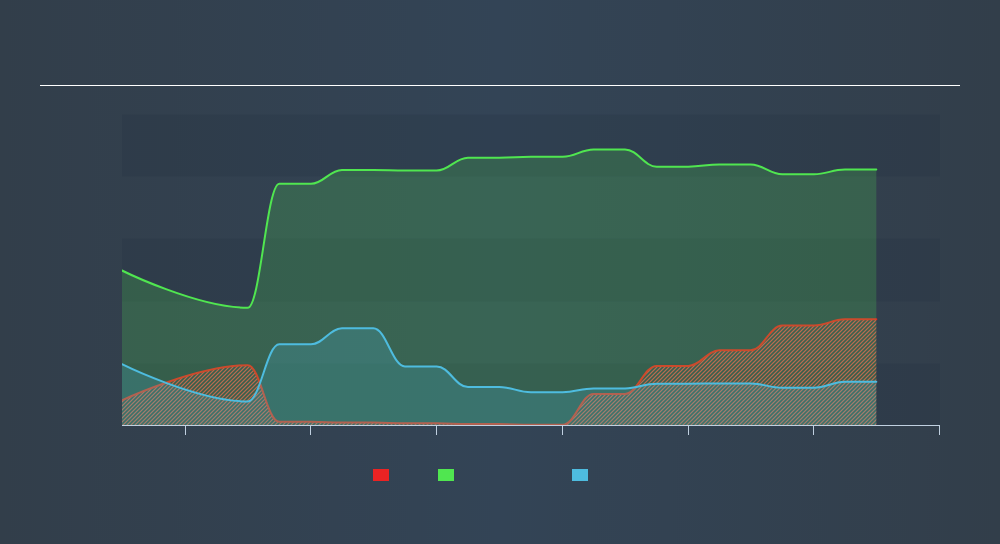- Australia
- /
- Healthcare Services
- /
- ASX:PSQ
We Think Pacific Smiles Group (ASX:PSQ) Can Stay On Top Of Its Debt

David Iben put it well when he said, 'Volatility is not a risk we care about. What we care about is avoiding the permanent loss of capital. It's only natural to consider a company's balance sheet when you examine how risky it is, since debt is often involved when a business collapses. We note that Pacific Smiles Group Limited (ASX:PSQ) does have debt on its balance sheet. But the more important question is: how much risk is that debt creating?
Why Does Debt Bring Risk?
Debt and other liabilities become risky for a business when it cannot easily fulfill those obligations, either with free cash flow or by raising capital at an attractive price. Ultimately, if the company can't fulfill its legal obligations to repay debt, shareholders could walk away with nothing. However, a more usual (but still expensive) situation is where a company must dilute shareholders at a cheap share price simply to get debt under control. Of course, debt can be an important tool in businesses, particularly capital heavy businesses. When we examine debt levels, we first consider both cash and debt levels, together.
View our latest analysis for Pacific Smiles Group
What Is Pacific Smiles Group's Debt?
The image below, which you can click on for greater detail, shows that at June 2019 Pacific Smiles Group had debt of AU$17.0m, up from AU$12.0m in one year. However, it also had AU$6.95m in cash, and so its net debt is AU$10.0m.

How Strong Is Pacific Smiles Group's Balance Sheet?
Zooming in on the latest balance sheet data, we can see that Pacific Smiles Group had liabilities of AU$17.6m due within 12 months and liabilities of AU$25.1m due beyond that. Offsetting these obligations, it had cash of AU$6.95m as well as receivables valued at AU$1.09m due within 12 months. So its liabilities outweigh the sum of its cash and (near-term) receivables by AU$34.7m.
Of course, Pacific Smiles Group has a market capitalization of AU$269.0m, so these liabilities are probably manageable. However, we do think it is worth keeping an eye on its balance sheet strength, as it may change over time.
We measure a company's debt load relative to its earnings power by looking at its net debt divided by its earnings before interest, tax, depreciation, and amortization (EBITDA) and by calculating how easily its earnings before interest and tax (EBIT) cover its interest expense (interest cover). The advantage of this approach is that we take into account both the absolute quantum of debt (with net debt to EBITDA) and the actual interest expenses associated with that debt (with its interest cover ratio).
Pacific Smiles Group's net debt is only 0.45 times its EBITDA. And its EBIT easily covers its interest expense, being 19.5 times the size. So we're pretty relaxed about its super-conservative use of debt. Also good is that Pacific Smiles Group grew its EBIT at 10% over the last year, further increasing its ability to manage debt. There's no doubt that we learn most about debt from the balance sheet. But ultimately the future profitability of the business will decide if Pacific Smiles Group can strengthen its balance sheet over time. So if you want to see what the professionals think, you might find this free report on analyst profit forecasts to be interesting.
Finally, a business needs free cash flow to pay off debt; accounting profits just don't cut it. So the logical step is to look at the proportion of that EBIT that is matched by actual free cash flow. Looking at the most recent three years, Pacific Smiles Group recorded free cash flow of 31% of its EBIT, which is weaker than we'd expect. That weak cash conversion makes it more difficult to handle indebtedness.
Our View
The good news is that Pacific Smiles Group's demonstrated ability to cover its interest expense with its EBIT delights us like a fluffy puppy does a toddler. But truth be told we feel its conversion of EBIT to free cash flow does undermine this impression a bit. We would also note that Healthcare industry companies like Pacific Smiles Group commonly do use debt without problems. Taking all this data into account, it seems to us that Pacific Smiles Group takes a pretty sensible approach to debt. That means they are taking on a bit more risk, in the hope of boosting shareholder returns. We'd be motivated to research the stock further if we found out that Pacific Smiles Group insiders have bought shares recently. If you would too, then you're in luck, since today we're sharing our list of reported insider transactions for free.
If you're interested in investing in businesses that can grow profits without the burden of debt, then check out this free list of growing businesses that have net cash on the balance sheet.
We aim to bring you long-term focused research analysis driven by fundamental data. Note that our analysis may not factor in the latest price-sensitive company announcements or qualitative material.
If you spot an error that warrants correction, please contact the editor at editorial-team@simplywallst.com. This article by Simply Wall St is general in nature. It does not constitute a recommendation to buy or sell any stock, and does not take account of your objectives, or your financial situation. Simply Wall St has no position in the stocks mentioned. Thank you for reading.
About ASX:PSQ
Pacific Smiles Group
Owns and operates dental centers under the Pacific Smiles Dental Centres and Nib Dental Care Centres names in Australia.
High growth potential with adequate balance sheet.
Market Insights
Community Narratives



